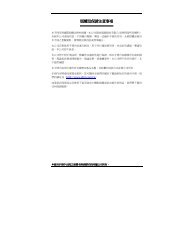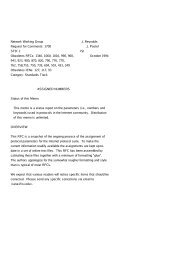Network Working Group R. Fielding Request for Comments: 2616 ...
Network Working Group R. Fielding Request for Comments: 2616 ...
Network Working Group R. Fielding Request for Comments: 2616 ...
You also want an ePaper? Increase the reach of your titles
YUMPU automatically turns print PDFs into web optimized ePapers that Google loves.
If the user has overridden the basic caching mechanisms, the useragent SHOULD explicitly indicate to the user whenever this results inthe display of in<strong>for</strong>mation that might not meet the server'stransparency requirements (in particular, if the displayed entity isknown to be stale). Since the protocol normally allows the user agentto determine if responses are stale or not, this indication need onlybe displayed when this actually happens. The indication need not be adialog box; it could be an icon (<strong>for</strong> example, a picture of a rottingfish) or some other indicator.If the user has overridden the caching mechanisms in a way that wouldabnormally reduce the effectiveness of caches, the user agent SHOULDcontinually indicate this state to the user (<strong>for</strong> example, by adisplay of a picture of currency in flames) so that the user does notinadvertently consume excess resources or suffer from excessivelatency.13.1.5 Exceptions to the Rules and WarningsIn some cases, the operator of a cache MAY choose to configure it toreturn stale responses even when not requested by clients. Thisdecision ought not be made lightly, but may be necessary <strong>for</strong> reasonsof availability or per<strong>for</strong>mance, especially when the cache is poorlyconnected to the origin server. Whenever a cache returns a staleresponse, it MUST mark it as such (using a Warning header) enablingthe client software to alert the user that there might be a potentialproblem.<strong>Fielding</strong>, et al. Standards Track [Page 78]RFC <strong>2616</strong> HTTP/1.1 June 1999It also allows the user agent to take steps to obtain a first-hand orfresh response. For this reason, a cache SHOULD NOT return a staleresponse if the client explicitly requests a first-hand or fresh one,unless it is impossible to comply <strong>for</strong> technical or policy reasons.13.1.6 Client-controlled BehaviorWhile the origin server (and to a lesser extent, intermediate caches,by their contribution to the age of a response) are the primarysource of expiration in<strong>for</strong>mation, in some cases the client might needto control a cache's decision about whether to return a cached













